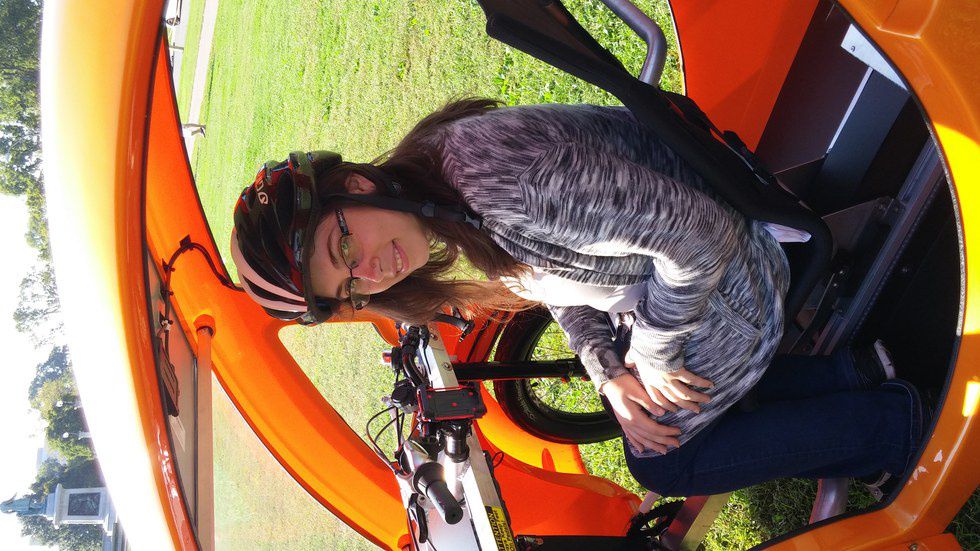This past weekend, I had the honor to meet and talk to some wonderful entrepreneurs on the Ignite Sullivan retreat sponsored by Entrepreneurship for the Public Good and organized by Tran Nguyen.
- You have to be more than your grades.
Perry Wilson telling us his story.
We are raised and brought up to believe that grades are one of the core measurements of our worth to society. Such perceptions are challenged by people like Perry Wilson.
Wilson was a student with dyslexia who struggled with grades all of his life. He failed many classes and never finished college, yet he has created a completely unique and powerful way of teaching math to students (that's right, math). He never learned math by textbooks or homework, instead he learned it through carpentry. The hands on application allowed him to advance in skills he never thought he had, because the education system wasn’t designed for the way he learned best. In his program, If I Had a Hammer, he builds a house with students, and through this, they learn the application of math skills in real life.
While grades can’t be completely discounted, they are not a full measure of our worth, and you can certainly be successful without them. It is action and innovation that allows us to truly succeed.
2. Compassion is a requirement.
Obed, Sam, Mursal, Julia, and Me with Nancy of Thistle Farms.
Something all the enterprises I visited last week had in common was a genuine care about people. At Thistle Farms, they provide a place to stay for 30 women recovering from addiction for a whole two years. Their dedication to the recovery and treatment of these women can be felt in every part of the business, from their "Love Heals" sweatshirts, to the layout of their cafe, each piece of furniture and decoration having value. These are women that base their mission on true and genuine love, and that is why it works. Social enterprise must have, at its center, care and compassion for the human soul and spirit.
Poverty & the Arts is an enterprise was a space designed to give the homeless a place to express themselves creatively, and increase their business acumen, in the hopes of selling their creations. To do this, a staff member had to inspire belief and compassion for people who maybe had given up on themselves long ago. This constant dedication to the worth and value of the human, and their creative energy, is something which made this enterprise unique.
Compassion, especially for social enterprises, is a requirement that allows these businesses to succeed in the ways they were meant to.
Me in an ELF vehicle.
In learning about ELF, which was a solar-powered bike with a car frame, one lesson I took away was their marketing strategy. They have marketed it by focusing on retirees and parents of college students, allowing their business to thrive. While college students don’t have the means of investing in ELF, parents, concerned for their children’s safety on busy Tennessee roads, were a great customer segment. This is a very specific niche of customers, and through this, it has found a way to encourage people to invest in clean energy
Finding the niche, that unique contribution you can make, and the specific place where you can make that contribution, is hyper important.
4. Teach a (wo)man to fish…or maybe to make coffee?
Brittany Caudle with coffee roasting machine at Harvest Hands.
Harvest Hands was an enterprise which taught young adults to cultivate a trade, such as soap making or coffee roasting, and then helped them market it. All those students involved in the program got direct profits from the work, and cultivated their business and entrepreneurship skills along the way.
Similarly, the work of the Refinery, which was an enterprise dedicated to growing the businesses and business ideas of Nashville, helped entrepreneurs get the resources they needed to grow into thriving, self-sufficient businesses.
As the saying goes, “give a (wo)man a fish, you’ll feed him (her) for a day, teach a (wo)man to fish, and you feed him (her) for a lifetime.” Learning and then marketing on specific trades and skills is extremely valuable in entrepreneurship, and is an important skill.
5. Dedication
Sisyphus sculpture at the Refinery
Entrepreneurship takes time. It means failures, set backs, constant adjustment. The founder of If I Had a Hammer took a salary of only $6,000 a year during his first few years working on it. It took him between six and seven years before he began to have any progress on his business. Thistle Farms, again, dedicates two years to the women in their care. Many of these enterprises started off small, but grew bigger. True growth comes with dedication to an end goal.
I want to end this article with a story we were told at the Refinery. The wooden art piece above this fifth lesson represents the story of Sisyphus. Sisyphus was condemned to an afterlife where he would have to move a boulder up a hill everyday, only to have it role down and start again the next day. Usually, it is a story of misery, but at the Refinery, they interpret it otherwise. To them, it's about the journey on the way up, what you learn, and what you experience. It's the knowledge that there will always be another challenge waiting for you, but that the challenge is worthwhile.
Let us all strive for that success.


























